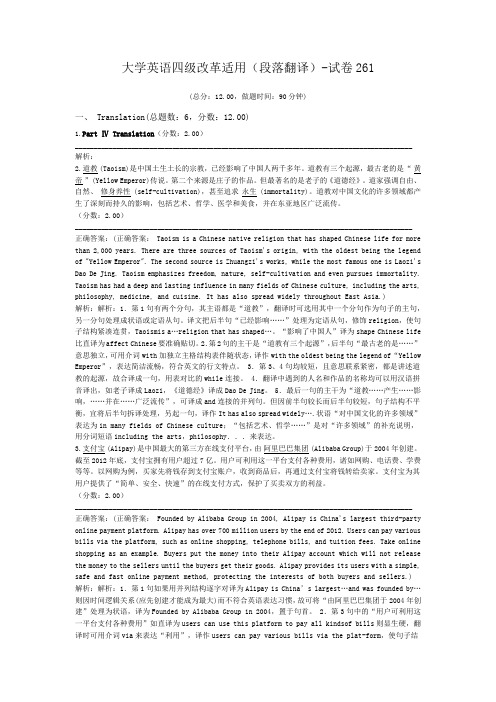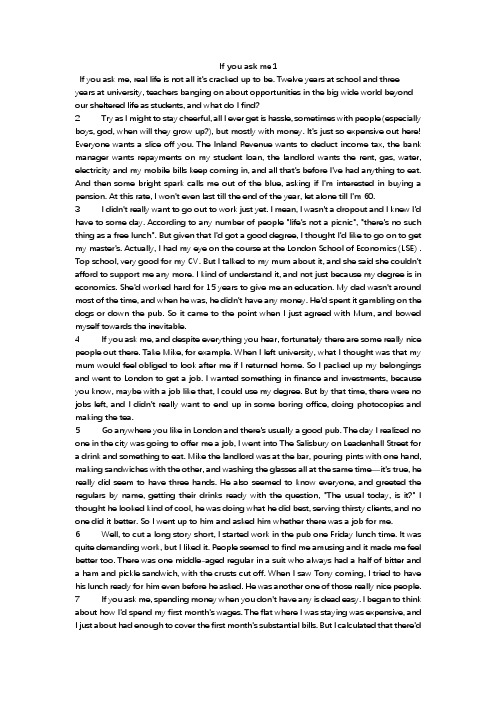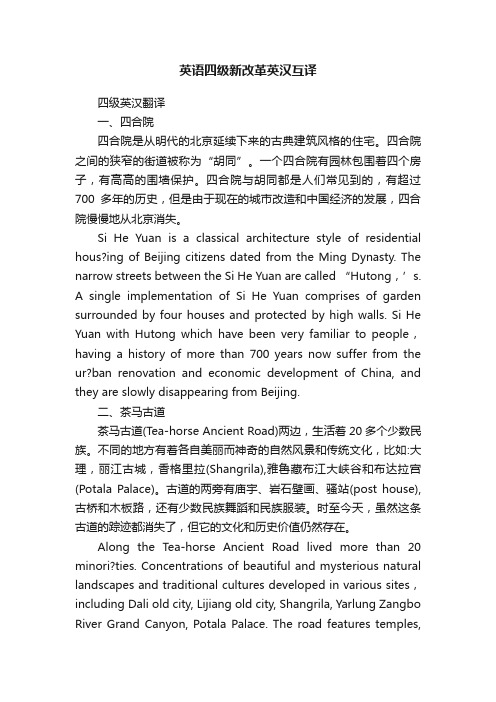新四级第六部分translation
- 格式:doc
- 大小:116.50 KB
- 文档页数:23

2020年6月英语四级翻译真题及答案2020年6月英语四级翻译真题及答案Part VI Translation (5 minutes)Directions Directions:: Complete the sentences by translating into English the Chinese given in brackets. Please write your translation on Answer Sheet 2.注意:此部分试题在答题卡2上; 请在答题卡2上作答。
87. The university authorities did not approve the regulation, ________________(也没有解释为什么也没有解释为什么也没有解释为什么).). 88. Jane is tired of dealing with customer complaints and wishes that she _____________(能被分配做另一项工作能被分配做另一项工作).).89. John rescued the drowning child______________________________________(______________________________________(冒着自己生命危险冒着自己生命危险冒着自己生命危险).).90. George called his boss from the airport but it _______________________________(_______________________________(接电话的却是他的助手接电话的却是他的助手接电话的却是他的助手).).91. Although he was interested in philosophy,________________________(________________________(他的父亲说服他他的父亲说服他他的父亲说服他) majoring in law.) majoring in law. 参考答案Part VI Translation87. ① nor did they make any explanation;② nor did they give the reason for doing so;③ and didn’t explain thereasons either88. ① could be assigned to another job;② could be assigned to do another job89. at the risk of his own lifeistant who answered / picked up the90. ① was his assphone;② turned out that his assistant answered / picked up the phone;③ turned out to be his assistant91. his father persuaded him into / talked him into。

Unit 6T ext A Old Father Time Becomes a T errorIn many ways, the style of this piece is typical of a certain variety of journalism. It is clearly not a new story, but nonetheless belongs within the pages of a newspaper. Such writing finds its home in the editorial or comment section where journalists and others contribute regular or occasional columns reflecting on topical issues.Unlike news stories where reporters are expected to confine themselves to the facts; such columns are intended to give free range to the expression of personal opinion. At the same time, particularly in the more serious papers (and the paper from which this comes, the Financial Times, certainly belongs to this category) the writer is expected display this familiarity with the problem under discussion.This is frequently achieved by employing concession. Thus, here the writer, having outlined the problem of the pressure of time, goes on to concede that not everybody is affected to the same extent. He then details the differences that exist before returning to his more general point and concluding with his solution, another characteristic ingredient of such editorial articles.His general conclusion is hardly new, having been advice offered by philosophers for as back as one cares to go, but gains novelty set against the context to recent technological developments.Although not a news story, the article nevertheless shares with newspaper reporting in general a taste for seeking support from the use of direct quotations from a number of different people. These quotations are provided together with the name of the person and background information on them.These details add human interest and support the argument by reference to the utterances of someone who appear to be in a position to know. As the quotations record spoken rather than written English, the tone of language is often colloquial. The frequent peppering of an article with this type of direct quotation stands in contrast to what is usual in a more purely academic essay.TIntroduction of the Author:•Richard TomkinsTheconsumer industries editor of the Financial Times, where he has been a member of the editorial staff since 1983. He is currently based at the company’s London headquarters, whe re he leads a team of journalists covering the consumer goods sector and writes about consumer trends, Tomkins was born in Walsall, England, in 1952. His formal education ended at the age of seventeen.Before becoming a journalist, he was a casual laborer, a factory worker, a truck driver, a restaurant cashier, a civil servant, and an assistant private secretary to a government minister. He left government service in1978 to hitchhike around the world, and on returning to the U.K. in 1978,joined a local newspaper as a trainee reporter.He joined the Financial Times as a sub-editor(副编辑, 副主编) four years later. In this selection, he discusses the time squeeze that many people are experiencing and offers a way of combating the problem.Part IIPre-questionsPPre-questions1. How does the singer treat his diary? Why? (He treats it as a friend, to whom he can pour out hisinmost feelings.)2. Can we infer what attitude the singer takes towards the pace of life today? (It’s unwise forpeople to be always in a rush, so much so that they don’t have time either for each other or for themselves.)3. Do you keep a diary? What sort of things do you write about?4. What does the singer think about how other people spend their time?Part IIIComprehension Questions1, What did we use to expect from technology?2、In what ways have inventions such as the motorcar and the aircraft affected our life? And whatabout the advent of washing machine?3、What new burdens has technology produced apart from cramming work into our leisure time?4、How fast is information generated today as compared to a couple of centuries ago?5、What is Edward Wilson’s purpose in subscribing to sixty-old journals and magazine?6、What gives rise to our discontent with super abundance?7、Is everyone time-starved today? What percentage of the population is suffering under thestresses and strains of life today?8、What is stress envy, as conceived by Paul Edwards?9、How much free time has the average American gained since the mid-1960s?How are the gainsdistributed between the sexes?10、What is mean t by the “the growth of the work-life debate”?11、What does Godbey mean by saying “It’s the kid in the candy store”?12、For time stress, what remedy does the author offer?Part IV Language Points1. on the go / upon the go:(infml) active or busy [口]在进行活动, 忙碌; 刚要动身; 有醉意Examples:I’ve been on the go all week, preparing my thesis.I was on the go all day and went home at about 10’oclock in the evening.Part IV2. set about:begin(a task);start(doing sth.)(used in the pattern:set about sth./doing sth.; no passive)开始, 着手; 散布(谣言) ; [口]攻击; [俚]接连殴打, 乱打Example:The school authorities must set about finding solutions to the campus security problems.My mom and I set about clearing up / clearing the table after the guests left. 动手收拾(餐桌)--set about one's work开始工作Part IVPart I*3. eat into:gradually reduce the amount of (sth. valuable); damage or destroy腐蚀; 侵蚀; 消耗; 用掉一部分(eat in在家里吃饭, eat out)Examples:All these car expenses are eating into our savings.Responsibilities at home and work eat into his time.Our holiday travel has eaten into the money we saved.我们的假日旅游耗费了我们积蓄起来的钱。

大学英语四级改革适用(段落翻译)-试卷261(总分:12.00,做题时间:90分钟)一、 Translation(总题数:6,分数:12.00)1.Part Ⅳ Translation(分数:2.00)__________________________________________________________________________________________ 解析:2.道教(Taoism)是中国土生土长的宗教,已经影响了中国人两千多年。
道教有三个起源,最古老的是“ 黄帝”(Yellow Emperor)传说。
第二个来源是庄子的作品。
但最著名的是老子的《道德经》。
道家强调自由、自然、修身养性 (self-cultivation),甚至追求永生 (immortality)。
道教对中国文化的许多领域都产生了深刻而持久的影响,包括艺术、哲学、医学和美食,并在东亚地区广泛流传。
(分数:2.00)__________________________________________________________________________________________ 正确答案:(正确答案: Taoism is a Chinese native religion that has shaped Chinese life for more than 2,000 years. There are three sources of Taoism's origin, with the oldest being the legend of "Yellow Emperor". The second source is Zhuangzi's works, while the most famous one is Laozi's Dao De Jing. Taoism emphasizes freedom, nature, self-cultivation and even pursues immortality. Taoism has had a deep and lasting influence in many fields of Chinese culture, including the arts, philosophy, medicine, and cuisine. It has also spread widely throughout East Asia.)解析:解析:1.第1句有两个分句,其主语都是“道教”,翻译时可选用其中一个分句作为句子的主句,另一分句处理成状语或定语从句。


If you ask me1If you ask me, real life is not all it's cracked up to be. Twelve years at school and three years at university, teachers banging on about opportunities in the big wide world beyond our sheltered life as students, and what do I find?2 Try as I might to stay cheerful, all I ever get is hassle, sometimes with people (especially boys, god, when will they grow up?), but mostly with money. It's just so expensive out here! Everyone wants a slice off you. The Inland Revenue wants to deduct income tax, the bank manager wants repayments on my student loan, the landlord wants the rent, gas, water, electricity and my mobile bills keep coming in, and all that's before I've had anything to eat. And then some bright spark calls me out of the blue, asking if I'm interested in buying a pension. At this rate, I won't even last till the end of the year, let alone till I'm 60.3 I didn't really want to go out to work just yet. I mean, I wasn't a dropout and I knew I'd have to some day. According to any number of people "life's not a picnic", "there's no such thing as a free lunch". But given that I'd got a good degree, I thought I'd like to go on to get my master's. Actually, I had my eye on the course at the London School of Economics (LSE) . Top school, very good for my CV. But I talked to my mum about it, and she said she couldn't afford to support me any more. I kind of understand it, and not just because my degree is in economics. She'd worked hard for 15 years to give me an education. My dad wasn't around most of the time, and when he was, he didn't have any money. He'd spent it gambling on the dogs or down the pub. So it came to the point when I just agreed with Mum, and bowed myself towards the inevitable.4 If you ask me, and despite everything you hear, fortunately there are some really nice people out there. Take Mike, for example. When I left university, what I thought was that my mum would feel obliged to look after me if I returned home. So I packed up my belongings and went to London to get a job. I wanted something in finance and investments, because you know, maybe with a job like that, I could use my degree. But by that time, there were no jobs left, and I didn't really want to end up in some boring office, doing photocopies and making the tea.5 Go anywhere you like in London and there's usually a good pub. The day I realized no one in the city was going to offer me a job, I went into The Salisbury on Leadenhall Street for a drink and something to eat. Mike the landlord was at the bar, pouring pints with one hand, making sandwiches with the other, and washing the glasses all at the same time—it's true, he really did seem to have three hands. He also seemed to know everyone, and greeted the regulars by name, getting their drinks ready with the question, "The usual today, is it?" I thought he looked kind of cool, he was doing what he did best, serving thirsty clients, and no one did it better. So I went up to him and asked him whether there was a job for me.6 Well, to cut a long story short, I started work in the pub one Friday lunch time. It was quite demanding work, but I liked it. People seemed to find me amusing and it made me feel better too. There was one middle-aged regular in a suit who always had a half of bitter and a ham and pickle sandwich, with the crusts cut off. When I saw Tony coming, I tried to have his lunch ready for him even before he asked. He was another one of those really nice people.7 If you ask me, spending money when you don't have any is dead easy. I began to think about how I'd spend my first month's wages. The flat where I was staying was expensive, and I just about had enough to cover the first month's substantial bills. But I calculated that there'dbe just enough money over to treat myself to something. Why not get a CD or maybe a plant to cheer up the flat? I thought.8 It was my birthday on pay day. Apart from Mike and Tony, I didn't have any friends in London. Seeing that I didn't have a boyfriend either, you can understand why I began to feel sorry for myself. So I ordered myself some flowers, and asked them to be sent with a little card, saying "With all my love Anon." The highlight of my birthday would be the confused look on the florist's eyes when he delivered them.9 Later that week, Tony came in as usual and sat down at the bar. "What's wrong with you? Where's that smile gone today?" I talked to him about... well, about pretty well everything, money, the master's, my birthday, the lot. He sympathized with me.10 Tony got up from his stool, and went over to talk to some of the others. Remember: The Salisbury is right in the heart of the city, so all the customers were in banking or insurance or the stock market. Next day he turned up with cheques to the value of £20,000. "This is a loan for you to set up your business. The only collateral you have is my trust in you that one day, you'll pay us back—if you can. And if you can't, too bad, that's the finance business for you. But I think you will."11 I didn't say anything for fear that I was going to cry. What were the odds on anyone being so nice?12 And the flowers? I redirected them to my mum, and they arrived for her on my birthday. She deserved them, don't you think?13 If you ask me, looking back after all these years, you only need one or two breaks in your life to succeed. The fact that the rest is hard work doesn't matter, it's still worth it.14 After a year working at The Salisbury, I got a place at the LSE, did my master's and found a job in an investment bank. I in vested the £20,000, and sold out before the 2008 crash.I paid back Tony and the other investors, with ten per cent annual interest, and set up my own firm. It exceeded all my expectations and is still a thriving business.15 Tony wrote me a thank-you note. He'd been in a car accident, and couldn't walk. The money I paid back would allow him to adapt his house so he could move around it in his wheelchair. This is what he wrote:16 "Thirty-five years in banking, and I've never made a better investment than the loan to you. You've repaid the money with interest, and my trust in you and your honesty 100-fold. If you ask me, investing in people gives the best return you can ever hope for."17 If you ask me, he's right. What do you think?依我看依我看,现实生活并没有人们想象的那么好。

英语四级新改革英汉互译四级英汉翻译一、四合院四合院是从明代的北京延续下来的古典建筑风格的住宅。
四合院之间的狭窄的街道被称为“胡同”。
一个四合院有园林包围着四个房子,有高高的围墙保护。
四合院与胡同都是人们常见到的,有超过700多年的历史,但是由于现在的城市改造和中国经济的发展,四合院慢慢地从北京消失。
Si He Yuan is a classical architecture style of residential hous?ing of Beijing citizens dated from the Ming Dynasty. The narrow streets between the Si He Yuan are called “Hutong,’s.A single implementation of Si He Yuan comprises of garden surrounded by four houses and protected by high walls. Si He Yuan with Hutong which have been very familiar to people,having a history of more than 700 years now suffer from the ur?ban renovation and economic development of China, and they are slowly disappearing from Beijing.二、茶马古道茶马古道(Tea-horse Ancient Road)两边,生活着20多个少数民族。
不同的地方有着各自美丽而神奇的自然风景和传统文化,比如:大理,丽江古城,香格里拉(Shangrila),雅鲁藏布江大峡谷和布达拉宫(Potala Palace)。
古道的两旁有庙宇、岩石壁画、骚站(post house),古桥和木板路,还有少数民族舞蹈和民族服装。
第六单元生活节奏课文A随着当今世界生活节奏日益加快,我们似乎一直在不停奔忙。
事情那么多,时间却那么少,我们该怎么办?里查德·汤姆金斯着手解决这一问题,并提出了建议。
时间老人成了可怕的老人理查德·汤姆金斯从前,我们以为技术发展会使我们的生活变得更安逸。
那时我们觉得机器会替代我们工作,我们则有越来越多的时间休闲娱乐。
但技术发展没有把我们解放出来,而是使我们成为奴隶。
新技术纷至沓来,令人目不暇接:一年涌现的技术创新相当于以前一千年。
而每一项新发明问世,就进一步吞噬我们的光阴。
比如,汽车曾使我们希望个人出行会方便得让人难以想像。
可如今,城市车辆运行得比马车时代还要慢,我们因交通堵塞而困在车内,徒然浪费生命。
飞机也曾有可能为我们拓展新天地。
问题是,飞机提供了新的天地。
其存在本身产生了对耗时的长途旅行的需求,这种旅行,如越洋购物,或远道前往地球的另一半参加会议,以前我们是根本无法想象的。
在大多数情况下,技术发展并未节省时间,而是使我们得以做更多的事。
在家里,洗衣机可望使妇女摆脱繁重的洗衣劳作。
但事实上,它们促使我们每天,而不是每星期换一次衣服,这就使熨洗衣物的工作量变成原来的7倍。
同样地,每周一次的沐浴为每日一次的淋浴所代替,使得用于个人穿着打扮的时间大大增加。
与此同时,技术发展不仅听任工作侵入我们的闲暇时间——带着便携式电脑去海滩综合症——而且添加了收发传真、电子邮件和语音邮件这些新的负担。
技术发展还向我们提供机会,在个人电脑上一连几小时处理软件故障,或把因特网上那些无用的信息塞进自己的大脑。
除去技术发展,因特网指出了我们为何感到时间如此紧迫的第二个原因:信息爆炸。
几个世纪以前,人类积累的几乎所有知识都能装在若干哲人的大脑之中。
CET4翻译部分讲解考试的最后一个阶段是翻译,5分钟处理5个句子。
四级阶段考生受词汇量和知识结构影响,基本缺乏双语翻译的训练和技巧,所以只是蜻蜓点水般做一些知识点练习,题目并非中高级口译资格证书考试的考生所形容的:“翻译难,难于上青天。
”四级试卷上的翻译部分,说其简单无非有三,其一,考题只考查汉译英,没有英译汉。
大学英语精读教材中,每课都有汉译英译句练习,应该是学生非常熟悉的题型。
相比较,考研翻译中的长句英译汉则把考生难得死去活来;其二,内容单纯,不需要专业理论知识。
题目内容既没有高难度的新闻翻译、文学翻译,也不涉及科技经贸翻译中的专业知识,只是一般的短句翻译,没有大主题语境,也谈不上翻译的“信、达、雅”标准,四级程度学生可以manageable。
第三,名为翻译,实为补全句子,考查语法结构和词组运用知识。
每句只涉及15个左右的英语词,需添入的部分也只有3到8个单词,其中隐含着四级水平考生应当掌握的句型、语法、词组知识点。
以下是样题所提供的5个翻译句子,我们根据其内容来推测可能考查的知识点:87.The substance does not dissolve in water _______________(不管是否加热)。
本句意为:不管是否加热,这种物质都不会溶解于水。
前半句所给的信息并不重要,考生凭四级词汇知识可以理解substance(物质)和dissolve(溶解)两个单词的意义。
考虑提示部分的汉语,“不管…是否…”即“whether… or …”,很容易找到这个对应结构。
关键点在于对“加热”的理解,是主动还是被动处理,从上下文意义推断出是water 被加热,所以我们采用被动方式,即whether (it is) heated or not,填入部分作让步状语从句,it is可以被省略。
考查重点:从句知识:尤其让步状语从句,注意复习whether… or…, though, no matter how等表达的用法。
分词用法:注意辨别现在分词和过去分词,同时考虑动词被动语态的运用。
88.Not only ___________________(他向我收费过高),but he didn’t doa good repair job either.本句意为:他不但向我收费过高,而且东西修理得不怎么样。
本句中要考虑两个层面,首先是动词“收费”的对应词,应当是“charge”。
“过高”则往往使用too high或too much, 由于主体内容是金钱而不是温度,我们用经常搭配的“much”。
更加巧妙的用词是“overcharge”,恰好可以把意思归并到一起。
还要考虑的是本句中“not only…but…”结构中出现了否定词前置到句首的现象,自然是倒装句的标志。
结合后半句的一般过去时形式,我们不得不把助动词did提炼出来,按照倒装结构翻译成“Not only did he charge me too much”或者“Not only did he ove rcharge me”。
考查重点:倒装句结构中的否定词前置现象。
类似的知识点还要注意Never/Neither/Hardly/Scarcely等否定词在句首的倒装情况。
89. Your losses in trade this year are nothing ______________________(与我的相比)。
本句意为“你在生意中的损失与我的相比不值一题。
”翻译时有两个知识点容易出错,首先,“与…相比”考查词组知识,四级程度同学应当掌握“compared with”或者“in comparison with”, 但常有考生把“compare with”与“compare to”(把…比做)混淆,或者没有考虑过去分词形式。
此外,“我的”应当使用物主代词所有格“mine”,此处不宜写成“my losses”。
考查重点:词组知识:需要考生把握大批类似compare with以及名词形式in comparison with的词组或短语,其中固定搭配需要使用的介词/副词非常重要。
分词形式:在句子中做修饰成分与前者构成主动被动关系至关重要。
90. On average, it is said, visitors spend only _____________________(一半的钱) in a day in Leeds as in London.本句意为:据说,游客平均一天在利兹花掉的钱只有在伦敦的一半那么多。
显然本句在拿as…as…结构做文章。
因为是比较关系,把在Leeds和在London的费用做比较,所以后半句有明确的“as”一词。
空缺部分是要有“as”,还要有“half”和“money”。
关键是次序如何调理。
根据比较结构中的倍数原则,倍数数字放在最开始,接下去有关于量的as much n. as, 因此本句要填入“half as much money”。
考查重点:比较结构:本句考查同级比较中的倍数关系,类似表达还有twice as much(many) as…91. By contrast, American mothers were more likely__________________ (把孩子的成功归因于) natural talent.本句意为:相比较,美国的母亲们更可能把孩子的成功归因于天赋。
本句再次在词组方面进行考查,“把…归因于…”是大学英语四级考查率极高的一个语言点,有时表达因果关系最复杂的动词词组。
应当熟练把握“attribute…to…”的拼写和用法。
此外,不要忽略另外一个词的用法,“be likely to …”表示“容易”、“可能”等意义,稍不小心就会把to漏掉。
总之,需要填入的部分拼贴在一起就是“to attribute their children’s success to”。
2006年12月翻译真题1.Specialists in intercultural studies say that it is not easy to (适应不同文化中的生活).[ 06.12][解题步骤]:第一步:由it is not easy to可以推出,划线处应该接动词原形。
第二步:划分成分“适应不同文化的生活”核心谓语动词是“适应”,“不同文化的”作定语,“生活”作宾语。
第三步:(1).切块对应翻译:“适应”=adapt; adapt to; adapt oneself to;“生活”=life;“不同文化的”=different culture s(2).重新组合:adapt oneself to the life in different cultures[正确答案]:adapt oneself to the life/living in different cultures[翻译]:跨文化研究专家说,适应不同文化的生活不是一件容易的事情。
[考察知识点]:[词组固定搭配]adapt oneself to sth/doing sth“适应------”2.Since my childhood I have found that (没有什么比读书对我更有吸引力).[解题步骤]:第一步:由Since my childhood I have found that可以推出,划线处应该填写一个句子,时态需要根据后面的汉语意思作进一步的确定。
第二步:划分成分“没有什么比读书对我更有吸引力”核心谓语动词是“比------更有吸引力”,“没有什么”作主语,“读书”作宾语,“对我”作状语。
第三步:(1).切块对应翻译:“比------更有吸引力”= be more attractive to s b,“没有什么”=nothing,“读书”=reading,“对我”=for/to me。
(2).重新组合:nothing is more attractive to me than reading[正确答案]:nothing is more attractive to me than reading[翻译]:从儿时起我就发现,没有什么比读书对我更有吸引力。
[考察知识点]:[比较级]nothing+比较级=最高级;时态:因为从句叙述的是现在的事情,所以用一般现在是即可。
3.The victim (本来会有机会活下来) if he had been taken to hospital in time.[解题步骤]:第一步:由The victim if he had been taken to hospital in time.可以推出,划线处应该填写谓语动词和宾语使得主句完整,并且主句形式、时态根据后面的if he had been taken to hospital in time确定应该采取虚拟语气,是对过去的虚拟。
第二步:划分成分“本来会有机会活下来”核心谓语动词是“本来有机会------”,“活下来”作宾语。
第三步:(1).切块对应翻译:“本来有机会------”= would have a chance to do sth,“活下来”=survive(2).重新组合:would have a chance to survive.[正确答案]:would have/stand a chance to survive/of survival[翻译]:如果遇难者被及时送往医院的话,他本来会有机会活下来的。
[考察知识点]:[虚拟语气]与过去相反的虚拟语气,从句用had done,主句用would have done有机会做某事:have/stand a chance to do sth/of sth----[语法讲解]:“虚拟语气”考生应该注意以下几种虚拟语气的形式:第一种:由“ if ”引导的虚拟句子(1). 与现在的事实相反:[If --- + were/did---, --- + would do---]If I were you , I would marry him.如果我是你,就会嫁给他。
(2). 与过去的事实相反:[If --- + had done---, --- +would have done---]If you had worked hard , you would have passed the exam.如果你用功学习,就会通过考试了。
(3). 与将来的事实可能相反:[If ---+ should do---, ---+ would do---]If it should rain tomorrow , what would you do ?如果明天下雨,你怎么办?第二种:用在表示要求、建议、命令等的名词从句中从句谓语形式为:“---(should ) + do sth”(在美语中should常省去) 。